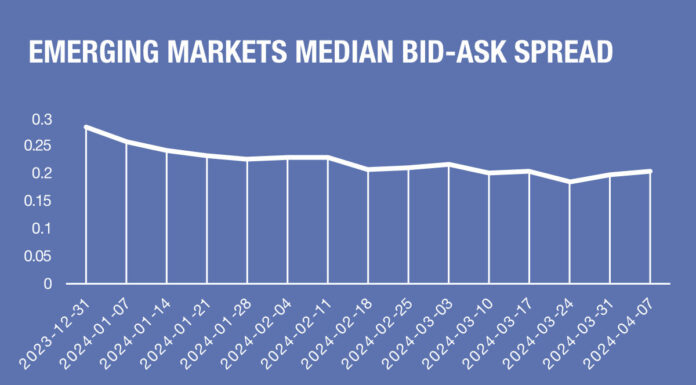Credit Suisse Group AG has agreed to pay nearly US$475 million to Swiss, UK and US authorities, including nearly $100 million to the US Securities and Exchange Commission (SEC), and £147 million (US$200 million) to the UK’s Financial Conduct Authority (FCA) with an undertaking to the FCA to forgive US$200 million of Mozambican debt owed by the Republic of Mozambique as a result of what are described as ‘tainted loans’.
Mark Steward, executive director of Enforcement and Market Oversight at the FCA, said, “The FCA’s fine reflects the impact of these tainted transactions which included a debt crisis and economic harm for the people of Mozambique. The fine would have been higher if not for Credit Suisse agreeing to provide the debt write-off of US$200 million. The FCA will continue to pursue serious financial crime control failings by regulated firms.”
According to the FCA, between October 2012 to March 2016, Credit Suisse failed to properly manage the risk of financial crime within its emerging markets business. It had sufficient information from which it should have appreciated the unacceptable risk of bribery associated with the two Mozambican loans and a bond exchange related to government sponsored projects.
Credit Suisse was aware Mozambique was a jurisdiction where the risk of corruption of government officials was high and that the projects were not subject to public scrutiny or formal procurement processes. The contractor engaged by Mozambique on the projects was described as a “master of kickbacks”.
Regulators have stated that the contractor secretly paid significant kickbacks, estimated at over US$50 million, to members of Credit Suisse’s deal team, including two managing directors, in order to secure the loans at more favourable terms.
The SEC’s order also finds that the scheme resulted from Credit Suisse’s deficient internal accounting controls, which failed to properly address significant and known risks concerning bribery.
“When it comes to cross-border securities law violations, the SEC will continue to work collaboratively with overseas law enforcement and regulatory agencies to fulfill its Enforcement mission,” said Gurbir Grewal, director of the SEC’s Division of Enforcement. “Our action against Credit Suisse today is yet another example of our close and successful coordination with counterparts in Europe and Asia.”
“Credit Suisse provided investors with incomplete and misleading disclosures despite being uniquely positioned to understand the full extent of Mozambique’s mounting debt and serious risk of default based on its prior lending arrangements,” said Anita Bandy, associate director of the SEC’s Division of Enforcement. “The massive offering fraud was also a consequence of the bank’s significant lapses in internal accounting controls and repeated failure to respond to corruption risks.”
A London-based subsidiary of Russian bank VTB separately agreed to pay more than $6 million to settle SEC charges related to its role in misleading investors in a second 2016 bond offering. According to the SEC’s order, the second offering as structured by VTB Capital and Credit Suisse allowed investors to exchange their notes in an earlier bond offering for new sovereign bonds issued directly by the government of Mozambique. But the SEC found that the offering materials distributed and marketed by Credit Suisse and VTB Capital failed to disclose the true nature of Mozambique’s debt and the high risk of default on the bonds. The offering materials further failed to disclose Credit Suisse’s discovery that significant funds from the earlier offering had been diverted away from the intended use of proceeds that was disclosed to investors. Mozambique later defaulted on the financings after the full extent of “secret debt” was revealed.
The SEC’s order against Credit Suisse finds that it violated antifraud provisions as well as internal accounting controls and books and records provisions of the federal securities laws. Credit Suisse agreed to pay disgorgement and interest totalling more than US$34 million and a penalty of US$65 million to the SEC. As part of coordinated resolutions, the US Department of Justice imposed a US$247 million criminal fine, with Credit Suisse paying, after crediting, US$175 million, and Credit Suisse also agreed to pay over US$200 million in a penalty as part of a settled action with the United Kingdom’s Financial Conduct Authority.
VTB Capital consented to an SEC order finding that it violated negligence-based antifraud provisions of the federal securities laws. Without admitting or denying the findings, VTB Capital agreed to pay over US$2.4 million in disgorgement and interest along with a US$4 million penalty.
Time and again there was insufficient challenge within Credit Suisse, or scrutiny and inquiry in the face of important risk factors and warnings. The Republic of Mozambique has subsequently claimed that the minimum total of bribes paid in respect of the two loans is around US$137 million.
According to the SEC’s order, these transactions that raised over $1 billion were used to perpetrate a hidden debt scheme, pay kickbacks to now-indicted former Credit Suisse investment bankers along with their intermediaries, and bribe corrupt Mozambique government officials. The SEC’s order finds that the offering materials created and distributed to investors by Credit Suisse hid the underlying corruption and falsely disclosed that the proceeds would help develop Mozambique’s tuna fishing industry. Credit Suisse failed to disclose the full extent and nature of Mozambique’s indebtedness and the risk of default arising from these transactions.
©Markets Media Europe, 2021
TOP OF PAGE






















